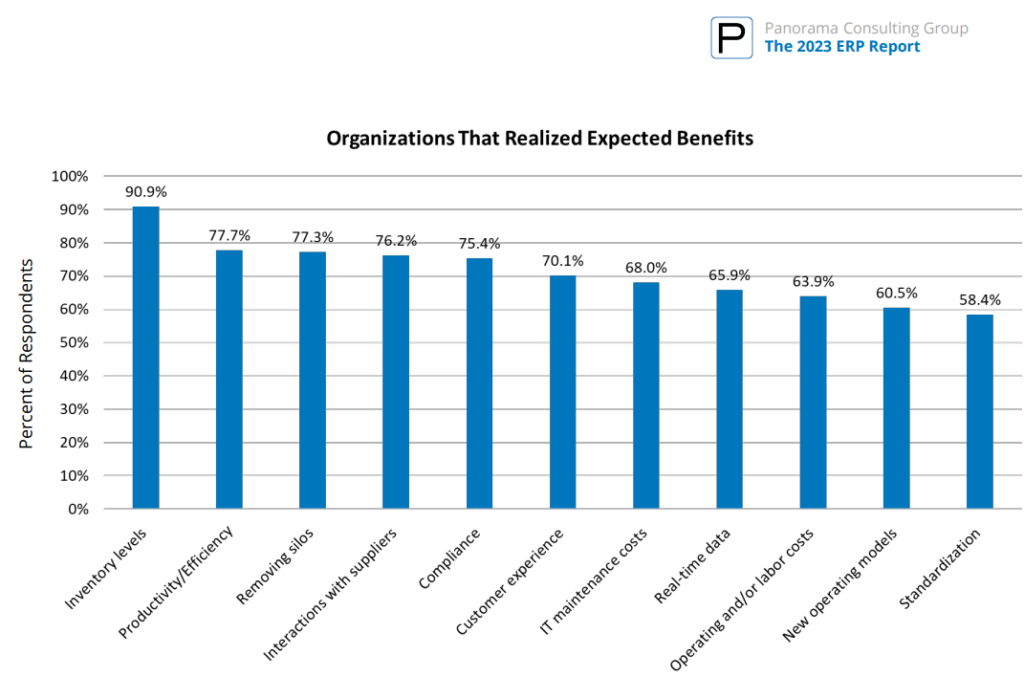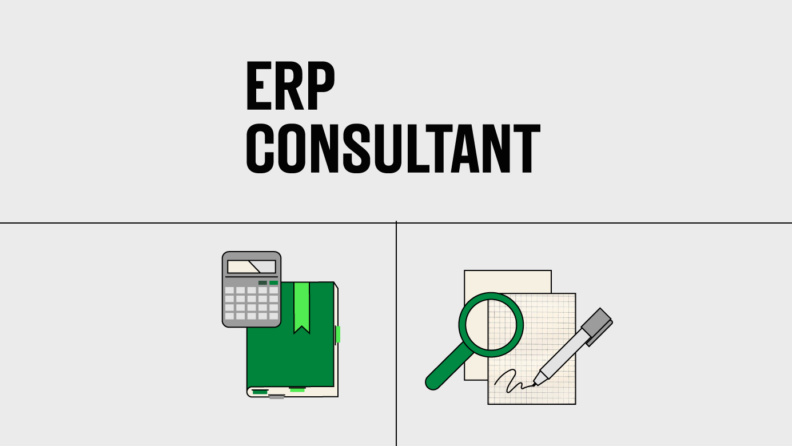The Unsung Heroes of Efficiency: ERP consultants bridge technology and business operations, ensuring a smooth transition to new ERP software while maximizing system potential and minimizing disruptions.
ERP Consultants Vary in Pricing: Rates for an ERP consultant typically range from $30 to over $200 per hour, influenced by factors like experience, complexity, location, and specialization.
Choosing Takes Time: When looking for an ERP consultant, consider things like previous work experience, industry expertise, references, business scope and requirements, and more.
As a seasoned B2B software analyst, I’ve spent years evaluating ERP systems and the experts who implement them. One key lesson? The difference between a smooth, cost-effective ERP rollout and a chaotic, over-budget disaster often comes down to one crucial player: the ERP consultant.
These professionals are more than just software specialists—they’re strategic advisors who bridge the gap between technology and business operations. In this article, I’ll break down what ERP consultants do, the expertise they bring to the table, and how to choose the right one to ensure your ERP implementation is a success.
What Does An ERP Consultant Do?
An ERP consultant helps businesses select, implement, and transition to new ERP software.
Most ERP specialists are industry experts, knowledgeable about specific integrations and upgrades your business needs to maximize your ERP system. Their expertise can speed up the ERP digital transformation process while minimizing costs and disruptions.
With their knowledge of best practices and industry specifics, they turn ERP investments into real growth drivers. In addition to smoother operations, ERP consultants also offer an objective and unbiased opinion on what will work best for your business.
Simply put, the right consultant can save time, money, and a whole lot of headaches when communicating with vendors.
Average Cost of an ERP Consultant
A quick search on UpWork showed ERP consultant rates range from $30 to over $200 per hour. But ERP Focus states the average rate for the most experienced ERP consultants is $150-175 per hour — which aligns with the range our experts gave.
ERP consultant charges typically range between $125/hour to $175/hour for 20-40 hours of work per week.
The ERP consultant’s fee range is typically reflective of:
- Experience: How much experience does the consultant have with successful ERP implementation?
- Complexity: How complex are your ERP requirements? Does it require a lot of customization?
- Location: Does the consultant need to travel to work with you?
- Software: What ERP software does the consultant specialize in? Experts in enterprise ERPs like SAP and Oracle’s NetSuite will probably charge a premium.
To understand why these factors impact cost, let’s first understand the responsibilities of an ERP consultant.
The Role Of An ERP Consultant
The ERP consultant job encompasses everything related to implementing and managing the ERP system, starting with:
1. System Analysis
Analyzing existing systems will help the ERP consultant understand your organization’s current tech stack, workflows, and business requirements. It’ll become the base on which the consultant builds their ERP implementation plan. They’ll need access to documentation, software, hardware, and employees to create an initial assessment.
2. Requirements Gathering
ERP consultants will thoroughly understand your business operations to determine your expected ERP features and integrations. To do this, the consultant will:
- Interview key stakeholders: Speaking to stakeholders from every level can help consultants understand day-to-day responsibilities, business management functions, and nuances. This is a crucial step in identifying real-world problems the ERP can solve for end users.
- Map out the existing process: ERP consultants will visualize your existing business workflows using all the data gathered during this phase. This will help identify any bottlenecks, gaps, and inefficiencies your new ERP can solve.
Doing this helps ERP specialists in their next step: selecting an ERP solution.
3. System Selection
Using information from the requirements gathering phase, consultants can identify ERP options with the right features, ERP integrations, etc. They can also use their experience and knowledge to negotiate better rates with ERP software and hardware providers.
4. Customization and Configuration
ERP specialists can customize your setup to meet industry-specific requirements. They can configure the system, develop custom workflows, and create custom connections. Going for a custom ERP setup lets you align your system with industry and business requirements.
A smart ERP consultant avoids unnecessary or inappropriate customization and makes sure that there is an optimal data migration, efficient staff training, and no delays or excess spending.
5. Implementation Process
ERP implementation is complex, involving detailed planning, execution, training, and maintenance. During this time, the consultant acts as your guide—it’s their job to develop an implementation plan with minimal disruption to business operations.
6. Training and Support
Inefficiencies and delays are common while employees get used to a new system. The best consultants address this by providing training sessions to help employees become familiar with the new systems and methodologies. Additionally, some may even offer continued technical support to resolve any issues.
Benefits Of Hiring An ERP Consultant
Paying those exorbitant consultant fees to implement the best ERP solution might be worthwhile because ERP consultants can:
Save Your Time and Money
You can leverage their experience and knowledge to identify possible pitfalls and requirements during the planning phase, saving time during the implementation process.
You can also leverage their connections to understand the ERP market and pricing, then get help negotiating better deals, reducing labor costs, and finding the right platform for your needs.
Improve Your Efficiency
According to Panorama Consulting Group, organizations that successfully implemented an ERP system saw a 78% increase in operational efficiency.

But pinpointing areas for business process improvement becomes increasingly challenging as your business grows. With more moving parts, it's not always clear whether you should focus on enhancing inventory management, reducing customer acquisition costs, or improving operational efficiency.
This is where an ERP consultant's expertise proves invaluable. They can identify key areas for enhancement and provide actionable recommendations to successfully implement the ERP to improve business efficiency.
Offer Expert Guidance
ERP specialists can offer expert advice at every step, from implementation to periodic maintenance. They can advise you on expected timelines, delays, and solutions. Moreover, they’re aware of integrations and updates that can help you get the most out of your selected ERP.
I have seen a CFO compliment a consultant on the progress of a project. The consultant said “thanks, but know that we will enter a difficult phase of the project. Your COO will probably complain about X, Y and Z sometime in the next few months.
And when the COO did complain about those things later, the CFO was not alarmed. This is an example of what sets a great ERP consultant apart from a good one.
How To Choose The Right ERP Consultant
Given that ERP projects typically span 6–12 months, it is essential to find a skilled ERP professional who aligns well with your organization's culture and goals. This will make working closely with them for extended periods more manageable.
Here are some key factors to consider while selecting an ERP consultant:
Evaluate Their Experience
The right ERP consultant’s resume will include the following:
- Educational Qualifications: Most ERP consultants hold Master’s and Bachelor’s degrees that offer foundational knowledge in business processes and technology like Business Administration, Information Technology, and Management Information Systems (MIS).
- Certifications: Industry- and platform-specific certifications acknowledge the consultant’s knowledge of that specific system. Popular ERP certifications include SAP Certified Application Associate, Oracle NetSuite Certified Professional, Microsoft Dynamics 365 Fundamentals, etc.
- Professional Experience: ERP consultants should have years of experience managing the full ERP implementation life cycle. They should be familiar with business analysis, project management, or IT. Coding knowledge can also come in handy during ERP customization.
- Communication Skills: ERP consultants should be able to effectively communicate with stakeholders across all levels, from technical teams to executives.
Some ERPs also provide certifications for individual modules. For example, Microsoft offers separate certifications for its Finance, Project Operations, and Supply Chain Management modules. Selecting ERP consultants that specialize in your selected platform ensures you get the most out of your ERP product.
Identify Industry Specialization
Not all ERP consultants focus on the same topics or areas of implementation. Finding an industry-specific ERP expert makes selecting, customizing, and implementing ERP systems according to industry nuances and requirements easier.
Here are a few of the different types of ERP consultants you may find in your search:
- Functional Consultants – Think of them as the translators between business needs and tech. They make sure the ERP system is set up to fit your company’s processes perfectly.
- Technical Consultants – The behind-the-scenes wizards who customize, integrate, and develop the ERP so it works smoothly with your other tools and meets your unique needs.
- Implementation Consultants – Your ERP project’s guide from start to finish. They handle everything from planning and setup to training and launch, making sure things go off without a hitch.
- Change Management Consultants – Change can be tough, but these consultants make it easier. They train your team, keep communication clear, and ensure everyone is on board with the new system.
- Industry-Specific Consultants – Experts in ERPs for your industry, whether it’s manufacturing, healthcare, or retail. They make sure your system follows best practices and industry rules.
- Project Management Consultants – The planners and organizers who keep your ERP project on track, on time, and on budget by coordinating between teams, vendors, and stakeholders.
- Support & Optimization Consultants – Even after go-live, these consultants stick around to troubleshoot, fine-tune, and keep your ERP running at its best.
Some ERP consultants may have experience in more than one area. With knowledge in different industries, ERP consultants can provide more tailored advice and insights, allowing you to get the most out of your implementation.
Check References and Reviews
A stunning resume is nothing if the consultant isn’t easy to work with. Ask the consultant for references to gauge their experience, work ethic, and success rates. Additionally, you can put on your detective’s hat and search the internet for reviews and feedback from previous clients.
Common Challenges in ERP Consulting
Here are some common challenges you can expect while working with an ERP consultant:
Scope Creep
Scope creep is quite common during ERP implementation. You expect the consultant to anticipate and mitigate them. But they’re unavoidable at times. Like unexpected costs arising from custom business system integrations and hardware.
You can minimize scope creep by answering all your consultant’s questions about existing systems, processes, and business expectations in detail. This will make selecting, customizing, and future-proofing ERP solutions easier.
Data Migration Issues
A key function of an ERP product is streamlining data management and usage. However, most ERP implementations struggle with data quality issues while migrating from legacy systems.
Ensure your ERP consultant considers data quality during implementation and creates data cleansing processes to weed out duplicates, missing entries, and inaccuracies.
Change Management
Adapting to new systems, processes, and expectations without the right support can be challenging for employees. It can lead to operational delays, employee dissatisfaction, and poor customer experiences. The right ERP consultant will consider the human element and develop strategies for a smoother transition, like:
- Learning pathways to onboard employees effectively.
- Feedback channels to gather first-hand employee insights.
- Support systems to address any concerns and difficulties.
Future Trends In ERP Consulting
The right ERP consultant will ensure your ERP systems align with the future industry trends:
AI and Machine Learning in ERP
Artificial intelligence and machine learning are used in ERP systems to meet personalization demands, automate business processes, and enhance data processing.
AI can automatically scan through millions of lines of unstructured data to quickly identify patterns, while machine learning can use structured data to predict trends accurately. In fact, the IBM Institute of Business Value recently found that organizations are using Gen AI solutions to improve profitability.
Cloud-Based ERP Solutions
According to Accenture, 86% of companies surveyed reported an increase in cloud adoption since 2020. This is true for cloud ERP adoption as well, with the market expected to reach an estimated $130 billion by 2027.
Most businesses are moving to the cloud because it offers better scalability, accessibility, and cost efficiency. Consultants should also be more cloud-focused, providing services to make the transition to the cloud easier.
Subscribe For More Insights Into ERP Implementation
Ready to learn more about ERP systems? Subscribe to our free newsletter for expert advice, guides, and insights from enterprise software leaders shaping the tech industry.




